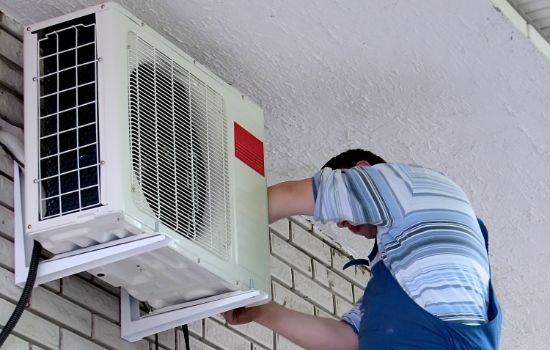In terms of guaranteeing satisfaction in our living spaces and offices, understanding HVAC units is important. HVAC, meaning heating, ventilation, and air conditioning, has a critical role in ensuring indoor air quality and temperature control. As utility costs continue to rise, being aware of how these systems function and their efficiency ratings can help homeowners and business owners develop informed decisions that lead to both comfort and savings.

One of the key components to grasp when picking or maintaining an HVAC system is the relevance of efficiency ratings. Two key metrics in this context are SEER, or Seasonal Energy Efficiency Ratio, and AFUE, or Annual Fuel Utilization Efficiency. These ratings offer clarity into how effectively an HVAC unit performs and can influence everything from installation costs to monthly energy bills. In this article, we will explore the definitions of SEER and AFUE, detailing how they affect the efficiency of heating and cooling systems and presenting guidance on selecting the right system for your requirements.
The Way Heating, Ventilation, and Air Conditioning Systems Operate
These systems, which stand for heating, ventilation, and air conditioning, are designed to control the environment within both residential and commercial spaces. These systems operate on the essential principle of heat transfer, using various components to either heat or cool the air. The two main purposes—heating and cooling—are achieved through various processes. Heating is usually done via furnaces, heat pumps, or boilers, while cooling is achieved through air conditioning units or chillers. Understanding how these components function in unison is crucial to maintaining a pleasant indoor environment.
Air circulates through the HVAC system via a network of ducts, which deliver treated air throughout the building. When heating is required, the system draws in cooler air, warms it, and pushes it back out through the ducts. In opposition, during warmer months, the air conditioning component cools the air by passing it over refrigerant coils. This procedure not only lowers the temperature but also dehumidifies the air, enhancing comfort levels. Proper airflow and ductwork design for maximizing efficiency in both heating and cooling modes.
Additionally, ventilation plays a critical role in maintaining indoor air quality. HVAC systems are equipped with filters that capture dust, allergens, and other pollutants, ensuring that the air circulated in your home or business is healthy and healthy. Regular maintenance, including changing filters and system inspections, can help deter common issues that may impact the effectiveness of the HVAC system. By understanding the operation of each component operates and works together, homeowners can make informed decisions about their heating and cooling needs.
HVAC Maintenance Tips
Regular upkeep of your HVAC system is essential to make certain it operates effectively and effectively. https://www.berkeys.com/air-conditioning/ of the easiest yet most important tasks is changing air filters. Obstructed filters restrict airflow, making your system operate harder and possibly leading to higher energy bills and early wear. It is advised to monitor filters on a monthly basis and swap them each 1 to 3 months, according to usage and the sort of filter.
Another important maintenance task is arranging yearly professional checks and service. A qualified technician can detect potential issues before they become serious problems, guaranteeing your system runs smoothly. During these inspections, the technician can service the components, test refrigerant levels, and inspect ducts for leaks. This preventive approach not only enhances efficiency but also increases the life of your HVAC system.
Finally, don’t forget the outdoor unit of your HVAC system. Clearing the area around the outdoor condenser clear of debris, leaves, and grass can help preserve proper airflow and cooling efficiency. Additionally, ensuring that the fins are free of dirt and not bent can further enhance performance. Frequently inspecting these areas and taking the required steps to keep them in good condition will help your HVAC system function optimally throughout the entire year.
Choosing the Right HVAC Unit
Choosing the appropriate HVAC solution for your home involves considering multiple critical factors, including the size of your space, your finances, and your energy requirements. Initially, assess the square footage of your residence and your specific heating and cooling requirements. A experienced HVAC technician can perform a load assessment to determine the appropriate system capacity, which ensures efficient performance and comfort. Investing in the correct size system will help prevent issues such as inadequate heating or cooling and unnecessary energy consumption.
Subsequently, consider the energy efficiency ratings of different HVAC units. Look for models with high Seasonal Energy Efficiency Ratio (SEER) for cooling and Annual Fuel Utilization Efficiency (AFUE) for heating. These ratings demonstrate how efficiently the systems operate, which can lead to lower energy bills over time. Additionally, think about the type of system that best suits your lifestyle. Options consist of conventional central air and heating systems, ductless mini-split units, or even smart solar-powered HVAC solutions, each with unique benefits.
Finally, think about the long-term maintenance aspects and potential upgrades for your chosen system. Regular maintenance is essential for keeping your HVAC system running efficiently, so think about how accessible service options are in your area. Additionally, look for elements that allow for future innovations, such as smart thermostats or compatibility with energy-efficient technologies. By taking these factors into account, you can reach an informed choice that improves your home's comfort and energy efficiency.
